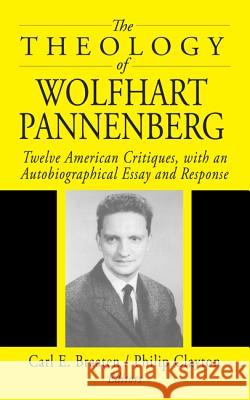The Theology of Wolfhart Pannenberg » książka
The Theology of Wolfhart Pannenberg
ISBN-13: 9781532603655 / Angielski / Miękka / 2016 / 354 str.
The Theology of Wolfhart Pannenberg
ISBN-13: 9781532603655 / Angielski / Miękka / 2016 / 354 str.
(netto: 172,49 VAT: 5%)
Najniższa cena z 30 dni: 178,65
ok. 16-18 dni roboczych.
Darmowa dostawa!
How deep has Pannenberg's influence been on American theology? Which particular ideas or themes from his work have been most pervasive to American thinkers, and which have encountered the greatest resistance? What implications does his work have beyond explicitly theological contexts--e.g., for philosophy, ethics, environmental concerns, political action, and the natural sciences? What new forms have his ideas taken as they have been adapted to fit the very different context of American theology? The authors of the twelve critiques in this volume represent a broad cross section of American thought on religion. The essays cover virtually all of the major areas in which Pannenberg has published. An introductory survey provides a comprehensive overview of the critical literature on Pannenberg from the early 1960s to 1986. Together, the essays represent an accurate barometer of the influence Pannenberg has had in America, as well as the sorts of reservations that the English-speaking world brings to his work. It has now been many years since Pannenberg's first visit to the United States. At that time the discussion with Pannenberg focused on the radically historical character of his proposal for theology, centering around revelation and resurrection. In the meantime, Pannenberg's thought has expanded almost encyclopedically into most of the major disciplines studied in a modern university. Without doubt the most comprehensive theologian at work today, his place in the history of twentieth-century theology is well assured. Carl E. Braaten, Professor of Theology at the Lutheran School of Theology at Chicago, is founding editor of Dialog: A Journey of Theology. Among his many books are Justification: The Article by which the Church Stands or Falls, Principles of Lutheran Theology, and, edited with Robert W. Jenson, Christian Dogmatics (2 vols.). Philip Clayton teaches in the Department of Philosophy at Williams college, Williamstown, Massachusetts."
How deep has Pannenbergs influence been on American theology? Which particular ideas or themes from his work have been most pervasive to American thinkers, and which have encountered the greatest resistance? What implications does his work have beyond explicitly theological contexts--e.g., for philosophy, ethics, environmental concerns, political action, and the natural sciences? What new forms have his ideas taken as they have been adapted to fit the very different context of American theology? The authors of the twelve critiques in this volume represent a broad cross section of American thought on religion. The essays cover virtually all of the major areas in which Pannenberg has published. An introductory survey provides a comprehensive overview of the critical literature on Pannenberg from the early 1960s to 1986. Together, the essays represent an accurate barometer of the influence Pannenberg has had in America, as well as the sorts of reservations that the English-speaking world brings to his work.It has now been many years since Pannenbergs first visit to the United States. At that time the discussion with Pannenberg focused on the radically historical character of his proposal for theology, centering around revelation and resurrection. In the meantime, Pannenbergs thought has expanded almost encyclopedically into most of the major disciplines studied in a modern university. Without doubt the most comprehensive theologian at work today, his place in the history of twentieth-century theology is well assured.Carl E. Braaten, Professor of Theology at the Lutheran School of Theology at Chicago, is founding editor of Dialog: A Journey of Theology. Among his many books are Justification: The Article by which the Church Stands or Falls, Principles of Lutheran Theology, and, edited with Robert W. Jenson, Christian Dogmatics (2 vols.). Philip Clayton teaches in the Department of Philosophy at Williams college, Williamstown, Massachusetts.











